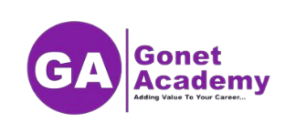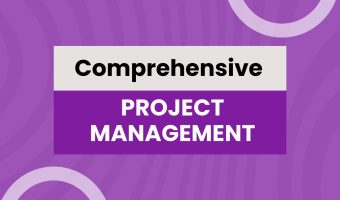Comprehensive Project Management
About This Course
This program provides an end-to-end understanding of project management principles, tools, and practices. It prepares participants to initiate, plan, execute, control, and close projects effectively using structured methodologies and modern tools. The curriculum balances theory with hands-on application to prepare students for real-world projects and globally recognized certifications.
Learning Objectives
Understand and apply the core principles of project management across the five process groups: Initiating, Planning, Executing, Monitoring & Controlling, and Closing.
Develop project planning documents including scope statements, Gantt charts, budgets, and risk registers using both manual and digital tools.
Manage project resources and teams, fostering collaboration, communication, and conflict resolution throughout the project lifecycle.
Apply risk management strategies, identify project threats and opportunities, and develop mitigation plans.
Monitor and evaluate project performance using performance indicators, earned value management, and reporting tools.
Integrate Agile and traditional project approaches in response to dynamic and hybrid work environments.
Demonstrate professional ethics and legal awareness in project procurement, contracts, stakeholder engagement, and closure processes.
Present a capstone project that synthesizes all knowledge and tools learned to propose or simulate a real-world project.
Target Audience
- Project officers, team leads, development workers, engineers, NGO staff, and aspiring project managers
Curriculum
78h
Module 1: Fundamentals of Project Management
Introduces the core concepts, language, and life cycle of project management. It establishes the foundation for managing time-bound, goal-driven work.
Topics Covered:
Definition and Characteristics of a Project,
Difference between Project vs. Operations vs. Program vs. Portfolio
Project Life Cycle and Process Groups
Role of the Project Manager
Stakeholder Roles and Responsibilities
Project Constraints: Scope, Time, Cost, Quality
Organizational Influences and Project Environment
Introduction to PM Standards and Methodologies and Standards.
Module 2: Project Initiation and Chartering
Covers the processes for identifying needs, defining project goals, conducting feasibility assessments, and writing a Project Charter.
Topics Covered:
- Business Case and Feasibility Analysis
- Stakeholder Identification and Analysis
- Project Charter Components
- Defining Objectives and Success Criteria
- Risk Identification at the Initiation Stage
- Kick-off Meeting Planning
Module 3: Project Planning – Scope, Schedule, and Cost
Equips participants with tools for planning project scope, timelines, and budgets. It includes work breakdown structures and Gantt charts.
Topics Covered:
Scope Definition and Control
Scope Management and Work Breakdown Structure (WBS)
Time Management: Gantt Charts, Critical Path Method (CPM)
Cost Estimation and Budgeting Techniques
Resource Allocation and Planning
Milestones and Deliverables
Tools: MS Project, Excel, ClickUp
Module 4: Risk and Quality Management
Covers how to identify, analyze, and respond to risks. Participants will also explore how to ensure project quality.
Topics Covered:
- Risk Management Process (Identification, Analysis, Response)
- Risk Matrix and Register
- Introduction to Quality Management (TQM, ISO, Six Sigma)
- Quality Planning, Assurance, and Control
- Tools: Fishbone Diagram, Pareto Analysis
Module 5: Project Team and Communication Management
Focuses on building project teams, managing interpersonal dynamics, and setting up effective communication systems.
Topics Covered:
- Project Human Resource Planning
- Team Formation and Leadership Styles
- Conflict Resolution and Team Dynamics
- Communication Channels and Plans
- Stakeholder Communication
- Tools: RACI Matrix, Communication Matrix
Module 6: Procurement and Contract Management
Teaches how to acquire resources and manage contracts and third-party vendors.
Topics Covered:
- Procurement Planning and Strategy
- Request for Proposals (RFP) and Tendering
- Contract Types (Fixed-Price, Cost-Plus, Time & Materials)
- Vendor Evaluation and Selection
- Contract Administration and Closure
- Legal and Ethical Issues in Procurement
Module 7: Monitoring, Evaluation, and Reporting
Introduces project monitoring systems, progress tracking, and performance reporting to ensure project alignment with goals.
Topics Covered:
- KPIs and Project Performance Metrics
- Earned Value Management (EVM)
- Status Reporting and Dashboards
- Mid-term and End-of-Project Reviews
- Change Control and Issue Tracking
- Linking M&E to Decision-Making
Module 8: Agile, Adaptive and Hybrid Approaches
Participants will explore Agile and hybrid frameworks, enabling them to manage projects in flexible and evolving environments.
Topics Covered:
- Introduction to Agile, Scrum, and Kanban
- Agile vs Traditional Project Management
- Sprint Planning and Reviews
- Adaptive Project Life Cycle
- Hybrid Project Frameworks (e.g., Agile-Waterfall Blend)
- Agile Tools: Trello, Jira
Module 9: Project Closure and Lessons Learned
Teaches the formal closing process, project evaluation, documentation, and knowledge transfer.
Topics Covered:
- Administrative Closure Checklist
- Handover and Client Acceptance
- Final Reporting and Audit
- Post-Implementation Review
- Documenting Lessons Learned
- Celebrating Project Success
Module 10: Project Leadership, Tools & Capstone Project
In this final phase, participants demonstrate leadership and project execution skills. Design and present a complete project plan and prepare for certification exams like CAPM or PMP.
Topics Covered:
Project Leadership and Team Building
Decision-Making and Critical Thinking
Project Management Tools (MS Project, Primavera, Wrike)
Capstone Project: Full Project Plan + Simulation
Project Presentation and Peer Review





